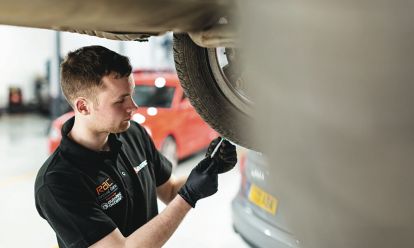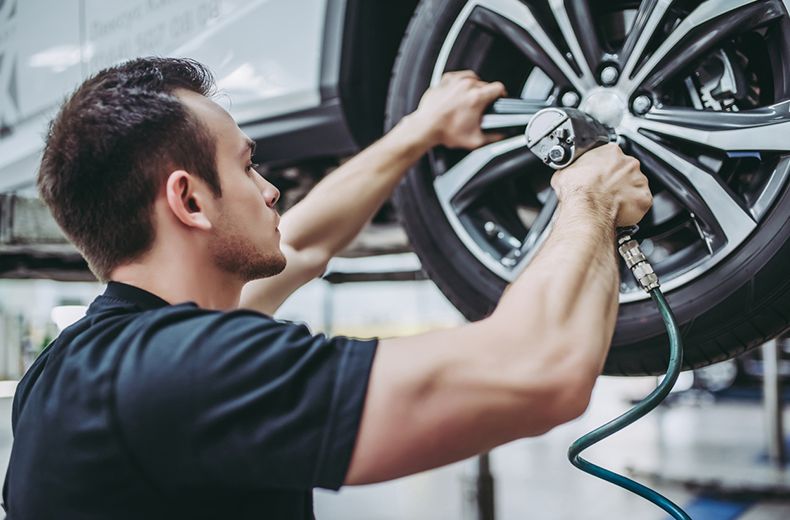But while getting a service may sound like a hassle, especially for new drivers who aren’t well-versed in car ownership, it doesn’t have to be.
We’ve put together this useful how to guide to everything you need to know about car servicing.
What is a car service?
A car service is a health check with routine maintenance for your vehicle which assesses everything from your engine’s fluid levels to the general wear and tear of your car.
Your vehicle has thousands of moving parts and it's vital that the core systems (brakes, suspension, wheels, engine, fluids, oils, steering, tyres and lights) are inspected by a qualified professional every 12,000 miles or 12 months (whichever comes first). Brake fluid should also be checked.
A service is usually undertaken by a mechanic and the most in-depth of them involve multiple system and component checks, adjustments, and parts replacement.
Why do I need a car service?
Regular servicing will mean your car is running as efficiently and safely as possible, and regular scheduled servicing may well end up saving you money in the long run.
By getting a regular service you’re likely to see improved fuel efficiency, better handling and a smoother running engine, as well as peace of mind from knowing your vehicle is running optimally. It also decreases the likelihood of your car breaking down either at home or at the roadside.
It can also help you avoid severe repair bills by nipping in the bud any issues that may lead to a problem over time. A full service history will also optimise your car’s market value should you choose to sell.
Regular vehicle servicing will almost certainly extend the life of your vehicle as well.
Is a car service the same as an MOT?
The MOT and car service might appear to be quite similar, but in reality they perform two very different roles.
The difference between the MOT and car service are:
- The MOT is an annual inspection that checks the safety and environmental impact of a vehicle and is a legal requirement for almost every vehicle on the UK’s roads.
- The service is a routine health and maintenance check, designed to keep your vehicle running smoothly and efficiently. Unlike the MOT, the service is not a legal requirement
Some motorists think they don’t need to get their car serviced because it’s just passed its MOT, but in reality the routine service and the MOT are different and it’s important to undertake both.
However, while an MOT checks a vehicle’s roadworthiness, it does not delve any deeper than that. A service does, and will ensure all components of your car are running as safely and efficiently as possible.
Get a service or repair at home
RAC Mobile Mechanics can come to you, saving you the hassle of going to a garage.


What does a car service include?

What is actually included in your service will be largely dictated by which type you choose, but a full service will likely involve an engine oil and filter change; a check of all fluids and a full brake check, plus usually checks other key components including safety-related features.
A more thorough (and expensive) service will check and replace a wider range of components and could include a change of spark plugs and a variety of important filters, as well as checking factors like wheel alignment and suspension.
A car service typically includes inspections, maintenance and/or repairs to ensure that your car is running safely and efficiently.
Typically, it will include a range of checks, including checking the oil, tyres, brakes, suspension, exhaust and other components. The service will also include topping up any fluids and changing the oil filter, if necessary.
Car services can also include minor repairs, such as tightening belts and adjusting the timing, as well as more extensive repairs.
It is important to note that a car service should not be confused with an MOT, which is a legal requirement for cars over three years old.
What is included in an interim service?
This is a less comprehensive version of a full service, and is designed to be carried about by a mechanic every six months or 6,000 miles – whichever comes first. This should not replace a full service, and is helpful in removing any issues before they become more severe.
At the RAC, an interim service includes the most important checks to ensure your car is safe and working correctly, an engine oil change and new oil filter will also be installed.
What is included in a full service?
This is the largest type of service available to motorists, and is vital in keeping your vehicle in the best condition possible.
With the RAC, it will include a thorough inspection of your vehicle. It will need to be done every 12 months or 12,000 miles – again, whichever comes first. The service will also include changes to engine oil, oil filters, and air filters. During a full service, a mechanic will analyse all the vital parts of the car, along with the safety and mechanical systems. For both interim and full services, they will replace items that have a certain lifespan, which if not dealt with can cause major issues.
Manufacturer service
If you have a higher spec vehicle, older car, or very expensive model, then you may need a manufacturer service.
The information on this would be found in the manufacturer’s handbook, and you would also need to take the vehicle to the manufacturer’s garage or dealership.
These are often a lot more expensive and will only include official parts and fluids – and they will be carried out by professionals from the manufacturer.
Get a car service at home
RAC Mobile Mechanics can come to you, saving you the hassle of going to a garage.


Major service
This is a more comprehensive version of a full service, and includes a wide range of replacements and fixes to the vehicle.
Which type of service should I choose?
The service level should equate to your annual mileage so it depends on your level of vehicle use.
| Service Type | Service Interval |
|---|---|
| Regular maintenance | When oil and filter need replacement |
| Interim Service | Every 6 months or 6,000 miles (whichever comes first) |
| Full Service | Every 12 months or 12,000 miles (whichever comes first) |
| Manufacturer Service | As per manufacturer service schedule, check your car manual for information |
How much does a full car service cost?
Expect to pay around £260 for a full service which should include an engine oil and filter change; a check of all fluids and a full brake check, plus other key components including steering, suspension and safety-related features.
How often do I need a car service?
Most manufacturers recommend putting your car in for a service at least once a year, or every 12,000 miles, whichever comes first, but this will depend on your car and your personal driving style. Some vehicles also now operate with extended mileages between services by using high quality lubricants.
If you plan on selling your car, a complete service history can add value as buyers will be more confident in what they’re buying.
Can you get a service at home?
In short, yes you can get a service from the comfort of your own home – or while you are at work.
With local Mobile Mechanics, you can have your car serviced throughout the day – and you don’t have to drop off/pick up your vehicle. Choosing between a mobile mechanic or local garage can be difficult – as both have any benefits.
If you think you can carry out your own car service – there are a few things you should consider. Safety is the most important part of any service, maintenance, or MOT.
If you have any advice for anyone looking at getting a service, leave your comments below.
Are you looking to carry out repairs on your own vehicle? Make sure you have the right tools! Check out RAC Shop.
Service, repair or MOT?
You can trust the RAC with our local approved garages and NEW mobile mechanics.


When was your last service?
In a 2025 RAC Drive poll of 12,332 readers, they were asked when drivers had their last service. Here are the results:
- Less than six months ago - 1830 Votes (14.8%)
- 6-12 months - 3612 Votes (29.3%)
- 1-2 years - 2576 Votes (20.9%)
- 2-3 years - 1144 Votes (9.3%)
- More than 3 years - 1189 Votes (9.6%)
- I don't know - 1981 Votes (16.1%)
What is a car service? FAQs
- What is full service?
A full car service is a comprehensive check and maintenance of a vehicle which includes a variety of tasks to keep the vehicle in good running order and in the best condition possible. This type of service is undertaken by a qualified mechanic and is often done in conjunction with an oil change and repairing general wear and tear. The full car service includes checking the brakes, suspension, steering, exhaust, oil, fluids, and lights, as well as performing an overall safety check. It also often includes a full diagnostic check of the vehicle’s engine, transmission, and other components. In some cases, a full car service may also involve the replacement of parts such as spark plugs and air filters.
Regular servicing can help to identify and address any potential issues before they become serious, saving money on repairs and making sure the vehicle is fit for the road.
- How do I get a copy of my car service history?
If you are looking to get a copy of your car service history, there are a few different ways you can go about doing this.
The first is to contact the dealership or garage where you had your car serviced and ask for a copy. They may be able to provide you with a record of the dates and type of work that was done. If you cannot remember which garage or dealership you used, you can always try calling them and asking for the details.
Another option is to contact your car manufacturer or a specific online resource that specialises in car service history. Many car companies will provide you with an online version of your car service history, or they may be able to provide you with a hard copy. You may need to provide some personal information to access this service.
Finally, you can try checking your car’s owner’s manual or other documentation that came with the car. Many manufacturers include a service history sheet in the documentation, which will provide you with a list of all the services that have been done to your car. - Do I need a full service every year?
At the RAC, we recommend a full car service once a year or every 12,000 miles, whichever comes first. This is important if you want to keep your vehicle in the best condition possible.
- What is included in a full service of a vehicle?
A full service of a vehicle typically includes an oil and filter change, a visual inspection of fluid levels and components, a wheel alignment check, a brake inspection, and an inspection of the air filter and other filters. Additionally, it may include a tire rotation, a spark plug replacement, a fuel filter check, a cooling system check and a check of the battery, charging system, electrical connections, and belts. A mechanic will also check of the suspension, exhaust system and steering components. Other services that may be included are a transmission service, a windshield wiper replacement, and a flush of the brake, power steering and cooling systems.
- What are the different services for a car?
Typically, there are three types of car service - interim, full and major. Although they may differ in the extent of the work carried out, it is important to have at least a full service every 12,000 miles or once a year.
- Is a full car service worth it?
Yes, a full car service is worth doing every year, as it will save you money in the long run, help the vehicle keep its value, notice any minor issues before they become larger ones, and make your vehicle run smoother.
- Does a full service include brake fluid change?
A full car service is a great way to ensure your car is running optimally and is a cost-effective way to maintain your vehicle. A full car service includes a thorough inspection and assessment of all the major components of your car, from the engine and transmission to the brakes, suspension and exhaust system. Through a full car service, any potential issues can be identified and addressed to help prevent more costly repairs in the future.
The benefits of a full car service go beyond just the financial savings. Regular servicing helps to extend the life of your car by ensuring the necessary components are in good condition and running correctly. It also helps to reduce the number of breakdowns and costly repairs. Plus, a full car service can help improve your car’s performance, fuel efficiency, and resale value.
It’s an important component of vehicle maintenance and can help keep your car running safely and optimally for years to come. - What is a car service book?
A car service book is an essential record of all the car service and repair work done on a vehicle. It is usually provided by a dealership or garage and contains details of all the work that has been carried out on the car, including dates, costs and any parts that have been replaced. It serves as a useful reference point for owners to refer to when they are trying to track down any problems that may arise with the vehicle, or to check whether routine maintenance has been carried out. It also acts as an important record for a car’s resale value, as it can show potential buyers that the car has been properly maintained.
- What happens if you lose a service book?
A car service book is an essential record of all the car service and repair work done on a vehicle. It is usually provided by a dealership or garage and contains details of all the work that has been carried out on the car, including dates, costs and any parts that have been replaced. It serves as a useful reference point for owners to refer to when they are trying to track down any problems that may arise with the vehicle, or to check whether routine maintenance has been carried out. It also acts as an important record for a car’s resale value, as it can show potential buyers that the car has been properly maintained.
- Do garages keep service records?
Yes, most garages will keep a copy of the service history, However, most larger garage brands will have a centralised system where they are kept.
- Types of car service
Car service can be divided into various types based on the level of care and maintenance required. Here are some of the most common types of car services: interim, full, major, and manufacturers.

RAC sale – up to 33% off*
• Roadside cover from £5.29 a month†
• We get to most breakdowns in 60 mins or less
• Our patrols fix 4/5 breakdowns on the spot














